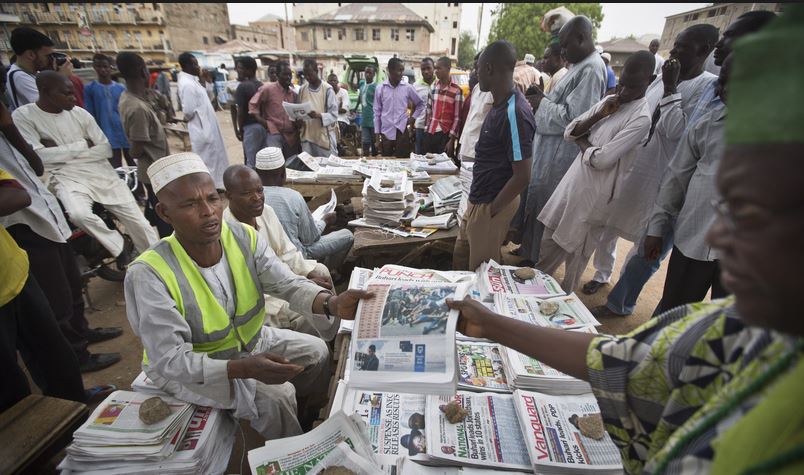The contraction of Nigeria’s Gross Domestic Product (GDP) growth rate by –6.10 per cent in the second quarter of the year and the killings during the clash between security officials and members of the Indigenous Peoples of Biafra (IPOB) in Enugu State are the trending stories in Nigerian newspapers on Monday.
ThisDay reports that Nigeria’s Gross Domestic Product (GDP) growth rate contracted by –6.10 per cent (year-on-year) in real terms in the second quarter of the year (Q2 2020), according to the National Bureau of Statistics (NBS).
The decline ends the three-year trend of low, but positive real growth rates recorded since the 2016/17 recession, the statistical agency said on Monday.
According to Nigerian Gross Domestic Product Report – Q2 2020 released by the NBS, the decline was largely attributable to significantly lower levels of both domestic and international economic activity during the quarter, which resulted from nationwide shutdown efforts aimed at containing the COVID-19 pandemic.
The NBS said: “The domestic efforts ranged from initial restrictions of human and vehicular movement implemented in only a few states to a nationwide curfew, bans on domestic and international travel, closure of schools and markets etc., affecting both local and international trade. The efforts, led by both the federal and state governments, evolved over the course of the quarter and persisted throughout.”
The newspaper says that the Department of State Services (DSS) stated that two of its operatives were yesterday killed by members of the Indigenous Peoples of Biafra (IPOB) at Emene in Enugu State.
It explained that several other people were also feared killed following a bloody clash involving members of IPOB and operatives of DSS at Emene.
The secret police said its patrol team was attacked by members of the organisation, leading to the death of the operatives.
A statement issued by DSS said the two personnel died “in what was clearly an unprovoked violent attack launched by IPOB on the team”.
The Punch reports that the global rights group, Amnesty International, says bandits killed 1,126 villagers in Nigeria between January and June 2020.
The organisation said that the most affected were villages in Southern Kaduna, where armed men killed at least 366 people in multiple attacks between January and July.
The AI said this in a report signed by its Director, Osai Ojigho, on Sunday
The organisation said it interviewed civilians in Kaduna, Katsina, Niger, Plateau, Sokoto, Taraba and Zamfara states, who said they lived in fear of attacks and abduction as insecurity escalated in the rural areas.
The newspaper says that gas, transmission, distribution and other constraints made Nigeria’s power sector to lose about N468.4bn between January and August 21 this year, latest documents on the industry’s performance have shown.
Also, the constraints in the sector stalled the production of a total of 33,122 megawatts of power during the about eight-month period.
The documents on the monthly performance of the sector since the beginning of this year obtained by our correspondent from the Federal Ministry of Power and the Presidency showed how the industry had been losing billions of naira since January. In January, for instance, the sector lost N56.41bn revenue, while in February and March this year, its revenues dipped by N54.96bn and N65.56bn respectively.
For the months of April, May, June and July, the power sector’s constrained revenues were N64.635bn, N61.601bn, N61.771bn and N63.207bn respectively. Findings showed that between August 1 and August 21, 2020, the sector lost N40.227bn due to the earlier highlighted constraints.
The Sun says that the Pharmaceutical Society of Nigeria (PSN) President, Sam Ohuabunwa, has confirmed that many local manufacturers in the pharmaceutical sector have accessed the Central Bank of Nigeria (CBN) N100 billion intervention fund to cushion the impact of the COVID-19 pandemic and have deployed the resources to capacity expansion.
Ohuabunwa said the capacity expansion, which include factory building, reconstruction, upgrading, buying new equipment, new factories and plants, was ongoing.
The PSN president, who made the disclosure in an interview, said the impact of the working capital fund, which was already in use, would be felt in three months time, while the fruits of the capital expenditure would yield by 2021.
Explaining that some companies yet to access the loan have not met the demands of the banks, he noted that some that accessed the loan have deployed their working capital to work while others were awaiting when the new investment goes through.
The Nation reports that the Nigerian Communications Commission (NCC) at the weekend urged telecommunication companies to reciprocate the reduction in the charges on Right of Way (RoW) by reducing data charges to Nigerians.
Its Executive Vice Chairman, Prof. Umar Garba Danbatta, stated this while addressing participants at the maiden virtual edition of the Telecoms Consumer Parliament (VTCP) at the NCC headquarters in Abuja.
Danbatta noted that considering the steps the Federal Government had taken to reduce the charges of RoW below N145 per linear metre while some states waived the charges outright, it had become necessary for operators to reciprocate the gesture.
“The commission is hopeful that with the reduction in RoW, which will automatically result in reduction in capital expenditure (CAPEX) by the network operators, telecom companies will sooner or later reciprocate the gesture by making their services, in particular, data services, more affordable to Nigerians,” he said.
GIK/APA


